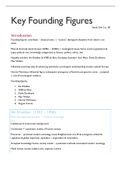Key Founding Figures Study Unit 3 p. 28
Introduction
Founding figures contribute – classical texts “canons” distinguish discipline from others, not
static.
Plato & Aristotle (lived Greece 427BC – 322BC) investigated issues forms social organisation &
types political rule, knowledge categorised as history, politics, ethics, law.
Notable scholars: Ibn Khaldun & WEB du Bois. European founders: Karl Marx, Émile Durkheim,
Max Weber.
Influential asserting value & advancing systematic sociological understanding society outside Europe.
Harriet Martineau influential figure subsequent emergence of feminist perspective come – accepted
overall sociological tradition.
Founding figures:
1. Ibn Khaldun
2. WEB du Bois
3. Émile Durkheim
4. Max Weber
5. Harriet Martineau
6. August Comte
Ibn Khaldun (1332 – 1406)
Non-European precursor – modern sociology
Past
Intellectual of aristocratic background.
Conducted 1st systematic studies of human society.
Precursor – practiced modern sociology arose Enlightenment era, IR & emergence industrial
capitalism & global expansion capitalism ≈ imperialism & colonialism.
Accepted knowledge human society similar – systematic methods associated modern sociology.
Made human society subject new, separate science.
,“Sociology” ≠ term, “science of history” expected different descriptive tendency of historical
studies.
Interested explaining factors inhibit from developing perfect society.
Writing require new systematic approach that must have:
Own peculiar object of study (mawdu)
Identify own peculiar problems (masa’il)
Own goal (ghaya)
Peculiar object = human society (umran).
Develop understanding humans as simultaneously indiv. & members of society.
Maqaddimah book
Maqaddimah: work regarded materialist, avoided philosophical conjecturing about human society.
Used historical method heavily dependent empirical observation & emphasis on economic factors.
Maqaddimah = study tribal culture, nomadic life & cities & settled life associated latter.
Central concept = sabiyah (force premier determinant of development of society).
Clarify meaning asabiyah → beginning description amongst nomadic Bedouin tribes prior – adoption
of Islam.
Helps describe formation of close relationships among people due – 1st blood kinship, 2nd common
descent, 3rd tribal group, how interacted with indiv. & determining factors indiv.’s thinking &
behaviour.
Emphasise NB feeling belonging members of group have, asabiyah transited – solidarity.
Present day
Research exploring complementarity of indiv. Psyche & psychology of group.
Acknowledges solidarity, based blood ties = replaced → other social ties when people come – live
urban settlements.
Identify less with tribe, adopt along with others shared identity as settlers of specific territory.
Looked factors (solidarity) & religion understanding human behaviour, also saw significant weight
economic factors have making sense of human intellectual pursuits, art, science, morals,
aesthetics & customs.
Wrote changes economic factors, nature of production, intellectual pursuits, arts & science,
morals, aesthetics & customs.
,Studied different stratification /social inequality patterns emerge & produce people dominant social
statuses depend labour of other social classes.
Wrote how states promote growth industrial & commercial act.
Attempted – make sense why societies alternated nomadic & settled urban types.
Interested social significance of establishing state based religious lines, theocracy.
Similar orientation as European Enlightenment thinkers, encouraged development knowledge about
human society, resisted religious-based thinking, saw God’s hand manipulating events.
Science human history sought rational explanations of logical & orderly evolution of societies
without arguing God consciously intervened & guided process.
Europe (1830 – 1900), non-European scholar making notable contribution – developing systematic
method of study human society.
Knowledge of work (1600s & 1806) translated – French.
Several notable European sociologists of late 19th century familiar with work, apparently little direct
influence on central figures discussed contribution – development of modern sociology during
course 19th century.
August Comte
Call for positive science of society
French scholar (1798 – 1857), living French Revolution (1798) brought social upheaval.
Church under question & belief God, foundations centuries of rule → royal families overthrown &
masses needed - know more about prospects changing world.
Felt sociology (“social physics”) was science time come – help give people better understanding of
issues about human interaction, institutions built, predict social events, guide introduction of
reforms – regenerate social order & progress.
Intellectual development influenced → Claude Henri Saint-Simon, worked for as secretary.
Saint-Simon espoused positivist ideals about studying social phenomena same way natural world
studied.
Supported socialist reforms conservative inclinations oppositions – modern society.
Comte came – dispute with Saint-Simon & work independently on explorations of possibility of
positivist science.
, Discontent with metaphysical views about human society & science society associated Immanuel
Kant & GWF Hegel (2 predecessors’ ideas considerably influential across modern Europe.
Favoured science of what directly observable.
Influenced → contemporary developments evolutionary views about human development &
intellectual comprehension of world.
Premier writing = Course of positive philosophy (2 laws – how humans generated knowledge about
world).
1st law = he law of three stages.
Theory of knowledge, how humans tried – make sense of world (refers – as “stages”).
Accepts that coexist, 1 more dominant than others.
1st stage = “theological state” & corresponds domination kings, warrior classes, priests.
Kings kept political order
Priests provided intellectual order
Dominant intellectual system = characterised → people relying fictions about God(s) as supreme
force causing events & giving direction – processes world.
2nd stage = “metaphysical stage” & corresponds dominant role both religious leaders & lawyers.
Characterised → abstract method of philosophy.
“essence” of phenomena & “forces” & “nature”.
≠ help produce knowledge where latter measured with certainty.
3rd stage = “scientific/ positive stage” \7 corresponds scientists & engineers playing leading role
society, humans come – understand world through scientific methods of observation.
2nd law = encyclopaedic / epistemological law
Different sciences develop evolutionary manner.
Mathematics = 1st science & facilitates sequential development of other sciences: astronomy,
physics, chemistry, biology, sociology.




